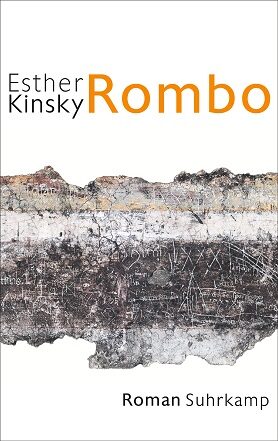Esther Kinsky
Rombo
[Rombo]
- Suhrkamp Verlag
- Berlin 2022
- ISBN 978-3-518-43057-6
- 267 Pages
- Publisher’s contact details
Published in Italian with a grant from Litrix.de.
Sample translations
The susurrations of brute matter
The prose here is extremely intense and poetic. It evokes in great detail the specific peculiarities of the terrain - a valley between the Carnic Alps, the Julian Alps and the Karavanks, where the local dialects alternate between Italian and Slovenian. The scientific enumeration of the region’s characteristics, chiefly those of a mineralogical and biological kind, yield an ever-changing picture full of scintillating effects. This does not serve to romanticise the loveliness of the landscape but rather to explain it through its geological data and the variations in its physical substance. And as a result a paradox inevitably begins to appear that never needs to be explicitly spelt out, but which hangs like a fateful pall over the book’s proceedings: this area seems like Paradise - but it harbours the constant threat of an earthquake.
Poetry, history and anthropology come together in a highly unusual combination in this book. This is already clear in its carefully chiselled outer form. Short chapters follow close on one another’s heels, with cleverly contrived references both backwards and forwards, and in the process individual villagers and their families gradually begin to fill the foreground. Their personal experiences are evoked in searing detail, but they are also contrasted with objectivising passages that focus specifically on the plant and animal world. In the first part of the book this procedure slowly gives rise to a multiply layered picture of the hours before the earthquake. A particularly powerful motif here is the black carbon-snake, a feature endemic in this valley which the local people endow with many attributes and consider obscurely portentous.
The earthquake itself, which occurred at around 9 p.m., is described from the point of view of a handful of local residents, and, as the narrative unfolds, their family circumstances, relationships and social positions become ever more distinct. Their poverty and vulnerability, and the fateful forces that dominate their lives, are demonstrated by means of numerous specific, highly charged motifs, such as the rituals followed in everyday life and on festal occasions. The legend of the ‘Riba Faronika’, or Pharaonic Fish - the mermaid with two tails - is especially striking, as are the local songs of the region, which are ‘neither sad nor cheerful’, but rather ‘plaintive yet devoid of passion’. An archaic community grounded in fatalism - portrayed here by the author through exceptionally vibrant and often lyrical imagery - finds itself confronted by natural processes that human beings can do nothing to change: the ‘susurrations of brute matter’.
In this book limestone, particular birds, particular colours characteristic of this landscape and the sky above it, are brought into conjunction with huge questions about humanity and community. The political factor in this embattled border area - ‘the partisans arrived from two different directions’ - is always present in the background. This outstanding and highly poetic work is not so much a German book as a richly faceted European one.
Translated by John Reddick

By Helmut Böttiger
Helmut Böttiger, born 1956 in Creglingen, studied German Literature and History. After serving for several years as Literary Editor of the Frankfurter Rundschau, he is now a freelance author, columnist and literary critic and lives in Berlin.
(Updated: 2020)
Publisher's Summary
In May and September 1976 two severe earthquakes devastated the north-eastern corner of Italy and its inhabitants. Almost a thousand people died beneath the rubble, tens of thousands lost their homes, many left their home area of Friuli for ever. The changes in the landscape that resulted from the quakes were massive, producing a new topography that makes plain the immense forces involved and offers an insight into the laws of nature. But it is not so easy to find words to convey the experience of the victims whose entire existence was so abruptly shattered.
In Esther Kinsky’s book - which won prizes even before it was published - seven men and women from a remote mountain village talk about their lives, which were profoundly affected by the earthquake. Their shared experience of terror and loss soon serves to tease out the threads of the various individuals’ memories, which in turn evolve into gripping and moving stories of deep harm that they had already suffered long before.
(Text: Suhrkamp Verlag)
